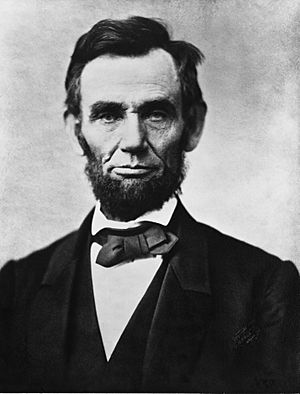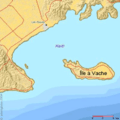Abraham Lincoln and slavery facts for kids
Quick facts for kids
Abraham Lincoln
|
|
|---|---|
 |
|
| 16th President of the United States | |
| In office March 4, 1861 – April 15, 1865 |
|
| Vice President | Hannibal Hamlin Andrew Johnson |
| Preceded by | James Buchanan |
| Succeeded by | Andrew Johnson |
| Personal details | |
| Born | February 12, 1809 Hodgenville, Kentucky, U.S. |
| Died | April 15, 1865 (aged 56) Washington, D.C., U.S. |
| Political party | Republican (1854–1865) National Union (1864–1865) |
| Other political affiliations |
Whig (before 1854) |
Abraham Lincoln was the 16th President of the United States. His views on slavery are a very important part of American history. Lincoln often spoke out against slavery, both in public and in private. He believed slavery was wrong.
Contents
Lincoln's Stance on Slavery
Lincoln showed his dislike for slavery early in his career. He saw it as a moral problem. He also worried about how slavery divided the country. His goal was to keep the United States together.
Early Opposition to Slavery
Lincoln became a strong opponent of what was called the "Slave Power." This term referred to the political influence of slave owners in the Southern states. They held a lot of power in the government. Lincoln felt this power was unfair.
In 1842, Abraham Lincoln married Mary Todd. Her family in Kentucky owned slaves. This shows how complicated the issue of slavery was at the time. Even families could be divided by it.
The Kansas-Nebraska Act
A law called the Kansas-Nebraska Act was passed in 1854. It allowed settlers in new territories to decide if they wanted slavery. This idea was called "popular sovereignty." Lincoln strongly disagreed with this act. He feared it would spread slavery to new areas. He believed the government should stop slavery from expanding.
Emancipation Proclamation and Freedom
The American Civil War began in 1861. It was fought between the Northern states (the Union) and the Southern states (the Confederacy). A major cause of the war was slavery. Lincoln used his powers as president during the war.
Issuing the Proclamation
In January 1863, Lincoln issued the Emancipation Proclamation. This important order declared that all enslaved people in the states fighting against the Union were free. It was a huge step towards ending slavery. However, it did not free slaves in states that remained loyal to the Union. It also did not free slaves in parts of the South already controlled by Union forces.
Working Towards Full Freedom
Even after the Emancipation Proclamation, Lincoln knew more was needed. He pushed for a new law to end slavery everywhere. This led to the proposed 13th Amendment. This amendment would make slavery illegal across the entire country. It became a key part of his plan for the 1864 election.
Lincoln's Vision for Equality
By the end of his life, Lincoln had even started to support voting rights for Black Americans. This idea was called black suffrage. He believed that Black soldiers who fought for the Union should have the right to vote. This position was very advanced for his time. Sadly, his support for these rights led to his assassination by John Wilkes Booth.
Images for kids
-
One of several failed colonization attempts during Lincoln's presidency was on the Île à Vache, off the coast of Haiti.
 | Delilah Pierce |
 | Gordon Parks |
 | Augusta Savage |
 | Charles Ethan Porter |




